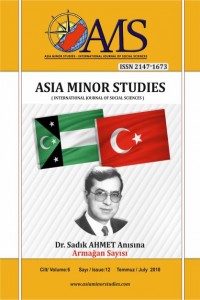Abstract
Lykaonia
covering the majority of today's Konya and Karaman cities is the name of the
ancient region in Central Anatolia. Due to its geographical location, it is
located at the intersection of the roads from north to south, from east to
west. The Lykaonia region, which is a continuous settlement area from the
Neolithic Period to the Antique Age, it needs different administrative
structures every period. One of these, under Antonius Pius's administration,
the southern borders of Lykaonia were separated and combined with Isauria and
Cilicia region. The Koinon structure was probably an administrative system that
came together to form a defensive structure against the Part threat. Thus, we
understand this situation from the words "Lykaonia Koinon" on the
Derbe, Barata, Ilistra, Dalisandos and Laranda coins from Antonius Pius to
Philippus Arabs (AD 244-249). The main theme of our work is to convey precise
and accurate information about the cult status of the cities that have coin
oppression, worshiped gods and goddesses, sacred animals, mythological stories
and heroes, emperors visiting the city.
Keywords
References
- Aulock, H. Von (1976). Münzen und Städte Lykaoniens. IstMitt, Beiheft 16: Tübingen.
- Bahar, H. (1991). İsauria Bölgesi Tarihi. (Yayımlanmamış Doktora Tezi), Konya: Selçuk Üniversitesi.
- Burnett, A. M. (1993). "Roman Provincial Coins of the Julio-Claudians". Essays in Honour of Robert Carson and Kenneth Jenkins. (Price, M., Burnett, A. M., & Bland, R., eds.), London: Spink, s: 145 – 153.
- Dio Cassius (1961). Historia Romana (Dio’s Roman History). With an English Translation by E. Car, London: The Loeb Classical Library.Göktürk, T. (1996). Anadolu Medeniyetleri Müzesi yıllığı, Sayı XI, Ankara.
- Habicht, C. (1959-60). Zwei neue Inschriften aus Pergamon. Istanbuler Mitteilungen 9–10, s. 109–127.
- Howgego, C. J. (1985). Greek Imperial Countermarks, “Studies in the Provincial Coinage of the Roman Empire”, London: Royal Numismatic Society.Magie, D. (1950). Roman Rule in Asia Minor. Volume I, Text, Princeton.
- Mitchell, S. (1993). Anatolia: Land, Men, and Gods in Asia Minor - Volume I The Celts and the Impact of Roman Rule. Oxford: Clarendon Press.Ramsay W.M. (1960). Anadolu’nun Tarihi Coğrafyası. (Çev.: M. Pektaş). İstanbul: Milli Eğitim Basımevi.
- Robert, L. (1980). À travers l'Asie Mineure : poètes et prosateurs, monnaies grecques, voyageurs et géographie, Athènes: École francçaise d'Athènes ; Paris (11, rue de Médicis, 75006 Paris) : Dépositaire, Diffusion de Boccard.
- Ruge, (1927). "Lykaonia maddesi", Paulys Realencyclopädie Der Classischen Altertumswiisenschaft, Neue Bearbeitung, Begonnen Von Georg Wissowa, Unter Mitwirkung Zahireicher Fachgenossen Herausge Geben Von Wilhelm Kroll, Seuchsundzwanzigster Halbband Lokroi bis Lysimachides, J.B. Metzlersche Verlagsbuchhandlung Stutgart.
- Sherk, R. K. (1969). Roman Documents from the Greek East. Senatus Consulta and Epistulae to the Age of Augustus. Baltimore.
- Strabon, 1993. Antik Anadolu Coğrafyası (Geogrqphika; Xll, XIII, XIV). (Çev.: A. Pekman). İstanbul: Arkeoloji ve Sanat Yayınları.
- Syme, R. (1995). Anatolica: Studies in Strabo, (Ed: Birley, A.), Oxford.
- Xenophon, 1998. Anabasis I (Onbinlerin Dönüşü). (Çev.: Tanju Gökçol). İstanbul: Sosyal Yayınları.
Abstract
Bugünkü Konya ve Karaman illerinin büyük
bölümünü kapsayan Lykaonia Orta Anadolu'da bulunan antik bölgenin ismi olarak
geçmektedir. Coğrafi konumu nedeniyle kuzeyden güneye, doğudan batıya giden
yolların kesişim noktası içerisinde yer alır. Neolitik Dönem'den Antik Çağ'a
kadar kesintisiz yerleşime sahne olan Lykaonia Bölgesi her dönem farklı idari
yapılanmaya gerek duymuştur. Bunlardan biri Antonius Pius'un
idaresinde Lykaonia’nın güney sınırlarının ayrılması, Isauria ve Kilikia
bölgesi ile birleştirilmesiydi. Koinon yapısı muhtemelen Part tehdidine karşı
bir araya gelip savunma yapısı oluşturmak için kurulan idari bir sistemdi.
Nitekim bu durumu Antonius Pius'tan Philippus Arabs'a (MS 244-249) kadar Derbe, Barata,
Ilistra, Dalisandos ve Laranda
sikkeleri üzerinde yer alan "Lykaonia Koinon" lejantından
anlamaktayız. Bu koinon sikkelerinin yardımıyla da koinon sikkesi darp
eden kentlerin kült yapısı, tapınılan tanrı ve tanrıçaları, kutsal hayvanlar,
mitolojik hikâyeler ve kahramanları, şehri ziyaret eden imparatorlar gibi
konularda kesin ve doğru bilgileri aktarmak çalışmamızın ana konusunu oluşturmuştur.
Keywords
References
- Aulock, H. Von (1976). Münzen und Städte Lykaoniens. IstMitt, Beiheft 16: Tübingen.
- Bahar, H. (1991). İsauria Bölgesi Tarihi. (Yayımlanmamış Doktora Tezi), Konya: Selçuk Üniversitesi.
- Burnett, A. M. (1993). "Roman Provincial Coins of the Julio-Claudians". Essays in Honour of Robert Carson and Kenneth Jenkins. (Price, M., Burnett, A. M., & Bland, R., eds.), London: Spink, s: 145 – 153.
- Dio Cassius (1961). Historia Romana (Dio’s Roman History). With an English Translation by E. Car, London: The Loeb Classical Library.Göktürk, T. (1996). Anadolu Medeniyetleri Müzesi yıllığı, Sayı XI, Ankara.
- Habicht, C. (1959-60). Zwei neue Inschriften aus Pergamon. Istanbuler Mitteilungen 9–10, s. 109–127.
- Howgego, C. J. (1985). Greek Imperial Countermarks, “Studies in the Provincial Coinage of the Roman Empire”, London: Royal Numismatic Society.Magie, D. (1950). Roman Rule in Asia Minor. Volume I, Text, Princeton.
- Mitchell, S. (1993). Anatolia: Land, Men, and Gods in Asia Minor - Volume I The Celts and the Impact of Roman Rule. Oxford: Clarendon Press.Ramsay W.M. (1960). Anadolu’nun Tarihi Coğrafyası. (Çev.: M. Pektaş). İstanbul: Milli Eğitim Basımevi.
- Robert, L. (1980). À travers l'Asie Mineure : poètes et prosateurs, monnaies grecques, voyageurs et géographie, Athènes: École francçaise d'Athènes ; Paris (11, rue de Médicis, 75006 Paris) : Dépositaire, Diffusion de Boccard.
- Ruge, (1927). "Lykaonia maddesi", Paulys Realencyclopädie Der Classischen Altertumswiisenschaft, Neue Bearbeitung, Begonnen Von Georg Wissowa, Unter Mitwirkung Zahireicher Fachgenossen Herausge Geben Von Wilhelm Kroll, Seuchsundzwanzigster Halbband Lokroi bis Lysimachides, J.B. Metzlersche Verlagsbuchhandlung Stutgart.
- Sherk, R. K. (1969). Roman Documents from the Greek East. Senatus Consulta and Epistulae to the Age of Augustus. Baltimore.
- Strabon, 1993. Antik Anadolu Coğrafyası (Geogrqphika; Xll, XIII, XIV). (Çev.: A. Pekman). İstanbul: Arkeoloji ve Sanat Yayınları.
- Syme, R. (1995). Anatolica: Studies in Strabo, (Ed: Birley, A.), Oxford.
- Xenophon, 1998. Anabasis I (Onbinlerin Dönüşü). (Çev.: Tanju Gökçol). İstanbul: Sosyal Yayınları.
Details
| Primary Language | Turkish |
|---|---|
| Journal Section | Research Article |
| Authors | |
| Publication Date | July 1, 2018 |
| Submission Date | May 5, 2018 |
| Published in Issue | Year 2018 Volume: 6 Issue: 12 |


